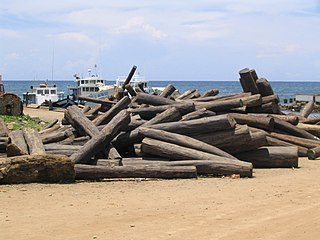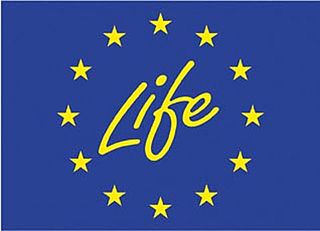Related Research Articles

The European Union (EU) is a supranational political and economic union of 27 member states that are located primarily in Europe. The Union has a total area of 4,233,255 km2 (1,634,469 sq mi) and an estimated total population of over 449 million. The EU has often been described as a sui generis political entity combining the characteristics of both a federation and a confederation.

The United Nations Economic Commission for Europe is one of the five regional commissions under the jurisdiction of the United Nations Economic and Social Council. It was established in order to promote economic cooperation and integration among its member states.

Illegal logging is the harvest, transportation, purchase, or sale of timber in violation of laws. The harvesting procedure itself may be illegal, including using corrupt means to gain access to forests; extraction without permission, or from a protected area; the cutting down of protected species; or the extraction of timber in excess of agreed limits. Illegal logging is a driving force for a number of environmental issues such as deforestation, soil erosion and biodiversity loss which can drive larger-scale environmental crises such as climate change and other forms of environmental degradation.
European integration is the process of industrial, economic, political, legal, social, and cultural integration of states wholly or partially in Europe, or nearby. European integration has primarily but not exclusively come about through the European Union and its policies.

Directorate-General for Environment is a Directorate-General of the European Commission, responsible for the Environmental policy of the European Union. In 2010 "relevant [climate change] activities in DG Environment" were moved to the new DG Climate Action. At the same time the DG Energy (ENER) was also established. The 2022 commissioner was Virginijus Sinkevičius.

The European Neighbourhood Policy (ENP) is a foreign relations instrument of the European Union (EU) which seeks to tie those countries to the east and south of the European territory of the EU to the Union. These countries include some who seek to one day become either a member state of the European Union, or become more closely integrated with the European Union. The ENP does not apply to neighbours of the EU's outermost regions, specifically France's territories in South America, but only to those countries close to EU member states' territories in mainland Europe.
Multi-level governance is a term used to describe the way power is spread vertically between levels of government and horizontally across multiple quasi-government and non-governmental organizations and actors. This situation develops because countries have multiple levels of government including local, regional, state, national or federal, and many other organisations with interests in policy decisions and outcomes. International governance operates based on multi-level governance principles. Multi-level governance can be distinguished from multi-level government which is when different levels of government share or transfer responsibility amongst each other. Whereas multi-level governance analyses the relationship of different state levels and interaction with different types of actors.'

Directive 2003/30/EC was a European Union directive for promoting the use of biofuels for EU transport. The directive entered into force in May 2003, and stipulated that national measures must be taken by countries across the EU aiming at replacing 5.75% of all transport fossil fuels with biofuels by 2010. The directive also called for an intermediate target of 2% by 31 December 2005. The target of 5.75% was to be met by 31 December 2010. These percentages were to be calculated on the basis of energy content of the fuel and were to apply to petrol and diesel fuel for transport purposes placed on the markets of member states. Member states were encouraged to take on national "indicative" targets in conformity with the overall target.
Saskia Luutsche Ozinga is a Dutch environmental and social activist. She is the facilitator of the Forest Movement Europe (FME) and the co-founder of the NGO FERN, which she was the campaigns coordinator, between 1995 and 2017.

Fern is a Dutch foundation created in 1995. It is an international Non-Governmental Organization (NGO) set up to keep track of the European Union's (EU) involvement in forests and coordinate NGO activities at the European level. Fern works to protect forests and the rights of people who depend on them.

The European Forest Institute (EFI) is an international organization established by the European states. It has 30 Member Countries, and c. 130 member organizations from 40 countries working in diverse research fields. EFI provides forest-related knowledge around three interconnected and interdisciplinary themes: bioeconomy, resilience and governance.

The Union for the Mediterranean is an intergovernmental organization of 43 member states from Europe and the Mediterranean Basin: the 27 EU member states and 16 Mediterranean partner countries from North Africa, Western Asia and Southern Europe. It was founded on 13 July 2008 at the Paris Summit for the Mediterranean, with an aim of reinforcing the Euro-Mediterranean Partnership (Euromed) that was set up in 1995 as the Barcelona Process. Its general secretariat is located in Barcelona, Catalonia, Spain.

CIFE - the Centre international de formation européenne is a not-for-profit European institution of higher education and research established in 1954. CIFE encompasses educational and research activities promoting European integration and governance, multilingualism and student mobility. CIFE educates European and international students as future Policy Officers in European institutions and international organisations, a professional title which is recognised by the French state.

The LIFE programme is the European Union's funding instrument for the environment and climate action. The general objective of LIFE is to contribute to the implementation, updating and development of EU environmental and climate policy and legislation by co-financing projects with European added value. LIFE began in 1992 and to date there have been five phases of the programme. During this period, LIFE has co-financed some 4600 projects across the EU, with a total contribution of approximately 6.5 billion Euros to the protection of the environment and of climate. For the next phase of the programme (2021–2027) the European Commission proposed to raise the budget to 5.45 billion Euro.

European Union–Pakistan relations are the international relations between the common foreign policy and trade relations of the European Union and the Islamic Republic of Pakistan. There has been no EU State Leader's visit for over twenty years.
Although for many decades, it was customary to focus on GDP and other measures of national income, there has been growing interest in developing broad measures of economic well-being. National and international approaches include the Beyond GDP programme developed by the European Union, the Better Lives Compendium of Indicators developed by the OECD, as well as many alternative metrics of wellbeing or happiness. One of the earliest attempts to develop such an index at national level was Bhutan's Gross National Happiness Index and there are a now a number of similar projects ongoing around the world, including a project to develop for the UK an assessment of national well-being, commissioned by the Prime Minister David Cameron and led by the Office for National Statistics.
Soil governance refers to the policies, strategies, and the processes of decision-making employed by nation states and local governments regarding the use of soil. Globally, governance of the soil has been limited to an agricultural perspective due to increased food insecurity from the most populated regions on earth. The Global Soil Partnership, GSP, was initiated by the Food and Agriculture Organization (FAO) and its members with the hope to improve governance of the limited soil resources of the planet in order to guarantee healthy and productive soils for a food-secure world, as well as support other essential ecosystem services.

The European Union (EU) Environmental Policy was initiated in 1973 with the "Environmental Action Programme" at which point the Environmental Unit was formed. The policy has thereafter evolved "to cover a vast landscape of different topics enacted over many decades" (Reuters) and in 2015 the Institute for European Environmental Policy estimated that "the body of EU environmental law" amounted to 500+ directives, regulations and decisions.
"Over the past decades the European Union has put in place a broad range of environmental legislation. As a result, air, water and soil pollution has significantly been reduced. Chemicals legislation has been modernised and the use of many toxic or hazardous substances has been restricted. Today, EU citizens enjoy some of the best water quality in the world"

Tanja A. Börzel is a German political scientist. Her research and teaching focus on the fields of European Integration, Governance, and Diffusion. She is professor of Political Science at the Otto-Suhr-Institute of Political Science of Freie Universität Berlin, director of the Center for European Integration, and holder of the Jean Monnet Chair for European Integration from 2006 until 2009. Currently, she is department chair of the Otto-Suhr-Institute of Political Science.
The European Union Forest Law Enforcement, Governance and Trade Action Plan is a European Union initiative to address illegal logging and the social, economic and environmental harm it causes. The EU adopted the Action Plan in 2003. The plan includes activities in the EU and in tropical countries that export timber and timber products to the EU. These measures include a regulation that prohibits EU businesses from importing or trading illegal timber, and bilateral trade agreements with timber-exporting countries. Much of the FLEGT Action Plan focuses on promoting trade in legal timber products and creating disincentives for trade in illegal products. However, the Action Plan's measures go further by addressing aspects of poor governance that enable illegal logging to persist.
References
- ↑ EFI site
- ↑ Well Grounded site
- ↑ The Courier Issue Nr II - September/October 2007 Archived 2008-09-08 at the Wayback Machine
- ↑ FERN site